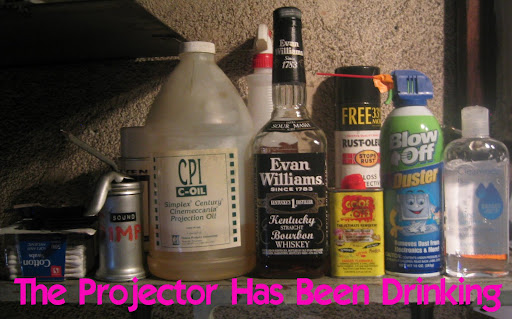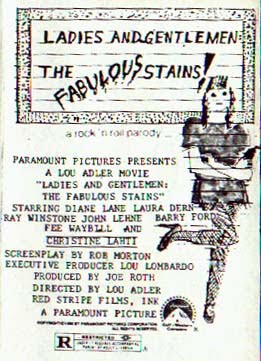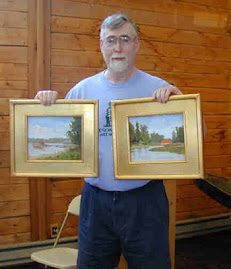But, I did let it sneak up on me. As you've noticed, things have been slower than Ben Stein reading aloud "The Rime of the Ancient Mariner" here at this blog. I even publicly shut the doors a month ago, partly out of humiliation that my output was so sporadic, and partly to parcel time on a more ambitious project. But when Marilyn Ferdinand and Farran Nehmes come calling, a man's gotta put on his typing gloves and do his part for the third year of their world-renowned For the Love of Film blogathon. The project, which this year boasts 100+ participants beyond myself, raises money for the National Film Preservation Foundation, and after the success of last year's focus, film noir and the restoration of the underseen THE SOUND OF FURY, they've raised stakes and gooseflesh by putting the emphasis on a very big Hitch...
...Yes, not only are all the blogathon entries going to cover the multitude of ideas that emerge from the legacy of Alfred Hitchcock, but the proceeds will be directed in the service of a heretofore thought-lost and now partially-found silent film, THE WHITE SHADOW, directed by Graham Cutts and written, assistant-directed, and manipulated in multiple manners by the Master of Suspense himself. The goal is to raise $15,000 to digitize the material, record the newly-composed score by Michael Mortilla, and stream this treasure online, free, so that everyone and not just lucky film snots in big cities or swanky circles can see this early beginning work of a legend.
If you drop his name to even the most limited movie viewer, chances are that person will be able to rattle off something that Alfred Hitchcock was known for. Surprise endings, chases in unusual places, blondes, taboo-pushing, black humor, "MacGuffins"...these and more have just permeated the world's consciousness. What fewer people assign trailblazer credit to him for, if ever, is his prescient courting of the public outside of the cinema: Hitchcock is, for my argument, the first Director as Rock Star.
Okay, maybe that's a stretch: at least perhaps Director as Pop Star: if Tarantino is generally perceived as the Elvis Presley, Hitchcock is undoubtedly the Frank Sinatra.
From the dawn of film to the '50's, there were plenty of acclaimed directors who could attract press and make news, but one is hard-pressed to find one that could be called a genuine household celebrity. The show business people that were getting the most notoriety were, of course, the movie stars, but then after that, the producers of hit movies: Mayer, Selznick, Zanuck, Warner, Goldwyn, etc. They were getting their names above the title much more often than directors were. Sure, there were producers who also directed - Cecil B. DeMille, Joseph L. Mankiewicz, Stanley Kramer - but they would be more likely to draw attention for building the cruise ship rather than physically steering the boat. Directors were important, but a little interchangeable - not as interchangeable as the hapless writer entrusted with delivering that Barton Fink feeling, but when David Selznick had George Cukor replaced with Victor Fleming on GONE WITH THE WIND, even if there had been an internet back then, there would have been no fanboy outrage when that news came out.
Being a celebrity was probably not on Alfred Hitchcock's mind when he was making his reputation in Hollywood, but he likely understood what it meant in terms of negotiation weight when making a film. He began his Stateside career working for Selznick, and it was a very fractious relationship, with Selznick often objecting to and overriding his stylistic choices during the four films he made under his contract. When making films for other studios, he also encountered casting and story dictates that irritated him. But Hitchcock knew his limits then, remarking "[Selznick] was the Big Producer...[and the] Producer was king. The most flattering thing Mr. Selznick ever said about me — and it shows you the amount of control — he said I was the 'only director' he'd 'trust with a film.'" So after first taking on the line producing tasks for his studio projects, he eventually became his own producer, financing movies through studios but often retaining intellectual property rights. So by the '50's, he gained a degree of creative control over his films, but what came next would give him the real leap to legend status.
The turning point came in 1955, when his then-agent Lew Wasserman, whose Music Corporation of America agency was branching into TV production, suggested that he host an anthology series focused on suspense, murder, chicanery, and other aspects of the macabre.
The series, "ALFRED HITCHCOCK PRESENTS," was an instant success that ran for ten years, inspiring networks to outbid each other to get the show every few years, and expanding from 30 minutes to an hour. Here was an acclaimed major motion picture director, already somewhat known to the average citizen for a fine body of films, now in every living room once a week, putting his stamp of approval on tales of shocking twists of fate, while making droll, stone-faced jokes, and even confiding to the audience that he disliked commercial breaks as much at them. Though he only directed a small fraction of the hundreds of episodes aired, just as Rod Serling became the icon for the uncanny and strange with "THE TWILIGHT ZONE," Alfred Hitchcock became the icon for the canny and cruel to a generation of TV viewers.
This is where Hitchcock transcends the mere title of "filmmaker" and becomes a brand name, an instant adjective that tells someone what they can expect. From here came Alfred Hitchcock literary anthologies, an Alfred Hitchcock mystery magazine, a book series for young adults with Hitchcock as mentor to adolescent detectives, "Music to be Murdered By..." It's a meaty coincidence that this activity coincides with the height of Hitchcock's collaborations with graphic artist Saul Bass, the man responsible for literally hundreds of familiar corporate logos, fonts, and advertising treatments, because Bass also understood how to use one single image to convey multiple ideas. It is no wonder that in all those dry introductions to the program scripted for him by James B. Allardice that he was punting the sponsor's pills so much - all that valuable airtime Bristol-Myers was taking to sell their products could have been used by Hitch to sell himself! All joking aside, Hitchcock rather liked the idea of becoming a TV pitchman: in The Alfred Hitchcock Presents Companion by Martin Grams Jr and Patrik Wikström, he suggested, "I'd like to take two asprin and, after swallowing them, stagger off the stage. Or, after brushing my teeth with some toothpaste or other, rinse and spit out a mouthful of teeth. Or show Joan of Arc being burned at the stake and comment, 'Are you smoking more now and enjoying it less?'" Such concepts the irony-free conglomerate probably did not see the humor in. But millions of people at home swallowed his schtick like Carter's Little Liver Pills (not a Bristol-Myers product), and now Hitchcock was easily more recognizable than any other working director of the time, and likely better recognized than many of the actors he treated like cattle.
And like any other high-profile star, ripe for parody:
"Sardines and milk weren't enough for you, Sylvester: you had to commit murder."
"Alvin Brickrock" (or is he really mad killer Albert Bonehart?) on "THE FLINTSTONES"
This kind of ubiquitous name recognition was good for more than just idle artistic gratification. Now, amidst a climate of growing changes with the way films and filmmakers were getting projects done in Hollywood, this gave Hitchcock muscle. When he was in a peculiar situation of having his previous Paramount project, VERTIGO, perform poorly, but finding tremendous success making NORTH BY NORTHWEST for another studio, he wanted to turn Robert Bloch's lurid novel PSYCHO into his final film under their contract, but Paramount twice rejected his proposal and claimed there was no room on their lot to film anyhow. He thus put up the entire budget himself, agreed to defer his normal directing fee in exchange for negative rights, and use his TV crew to shoot the film quickly at MCA's just-acquired Universal studio lot; with these terms, Paramount relented. He was taking on multiple significant risks: using his own money, using a crew with little experience in feature production, and making a film with subject matter so squirm-inducing that even in 1984 the MPAA still saw fit to give the movie an R rating. But he had the confidence to go with that gamble, and one can surmise that part of his reasoning was that with a steady base of discerning adults and a rapidly growing base of teenagers raised on his cathode ray catechism, they would all take the plunge into the icy blackness of a man's mind with him. And history proved him correct. We won't know if he would have taken the same risk had he not a solid television series and household popularity under his belt - his temperament suggests that he probably would have done the exact same thing - but as fans of Joss Whedon, who filled the theatres for his adaptation of THE AVENGERS after having their formative years filled with episodes of "BUFFY THE VAMPIRE SLAYER" would attest, it didn't hurt to have that in his CV. Hitchcock would not face another need to use his well-earned public goodwill as weight with a studio after the production of PSYCHO; he set up camp at Universal and stayed with the studio until his death, enjoying complete autonomy, and the only thing inhibiting any potential project he wanted to do was usually his own health.
As a new generation grew up into the '70's, whether it was Woody Allen actively cultivating his chatty nebbish on talk shows, or Francis Coppola arousing rumors in the gossip pages because the opening of THE GODFATHER was delayed from its intended Christmas '71 release to spring of '72, or the new style of celebrity journalism creating Steven Spielberg's myth of of the grown-up-wide-eyed-kid with a camera, the director was quickly eclipsing the producer as the Big Man On Cinema. For the first wave of Rock Star Directors like these two, or Martin Scorsese or Robert Altman, they didn't have to do much to sell themselves because in effect, critical opinion and box office returns were doing that job for them. But while they may have been spoken of in more ordinary households than, say, Vincente Minnelli or John Huston were during their earlier prime, they weren't yet celebrities; your aunt and her friends wouldn't know them if they saw them on TV. They were the Beatles, but they were still at the Cavern Club and weren't yet ready to fill Shea Stadium, so while they did benefit from the example of Hitchcock, and are certainly in his level of legend today, they are not what I would consider students of his style of active moviegoer courtship. It is with the dawn of home entertainment, the internet, and the "Sundance class of '92" movement, where we can really see how his astute creation of a public persona through a TV series and related marketing to draw audience interest to his films created a template that is commonplace today.
The two most apparent students of Hitchcock's strategy that come immediately to my mind are Spike Lee and Quentin Tarantino. These men did not have a reputation or body of work behind them like the directors that preceded them did; they were able to make a huge impression with their first films because they themselves made a huge impression on people. Island Pictures certainly worked hard to market his unusual debut comedy SHE'S GOTTA HAVE IT as they knew best, but it was Lee selling himself as an irascible motormouthed shitstarter, in Nike commercials and other strategic public appearances, that helped make the film a crossover hit and immediately thrust him into bigger-budgeted studio projects. Much as Hitchcock used the momentum of his public ubiquity to push back against an intransigent studio, Lee was also able to will his way into making one of his best and most signficant films, the biopic MALCOLM X, by first rallying his fans to protest the initial plan to hire Norman Jewison, a respected but rather uninspiring director, to make the film, and then through his unconventional long-lead marketing of hats, athletic wear, and other items with the bold simple black-and-grey "X" that would serve as the film's logo. And as mentioned earlier, for as much as he may like to issue troll-bait comments such as preferring PSYCHO II to the original, the trajectory in which Tarantino created his own public image as an energetic encyclopaedic auteur, through his archival reissue labels Rolling Thunder and Dragon Dynasty, and hundreds of talk show appearances where he'll somehow work Kim Jee-Woon and Kim Kardashian in the same sentence, demonstrates an understanding of Hitchcock's style of brand-building. Love them or hate them, if you say Spike Lee or Quentin Tarantino to someone who hasn't seen a movie since they created the PG-13 rating, they can give a semi-informed statement about them, or at least who they believe they're like. Their example is what has driven the Millenials to buy videocameras and shoot everything in sight in the hope of getting that standard rich-and-famous contract for a couple decades since.
Alfred Hitchcock did not likely anticipate that a cult of personality would build around directors when he became more famous than his movies. But I don't believe it would bother him. Like the murderers he loved to depict, he would understand the reason why: because in every caper, sooner or later, getting away with the plan is less important than making sure everyone knows you pulled it off. He was just the first and the best at inspiring a lot of people to commit cinematic crimes, and to inspire many more to hand over their loot.
And speaking of loot, here is the part of the program where we kindly ask you to empty your pockets:


















